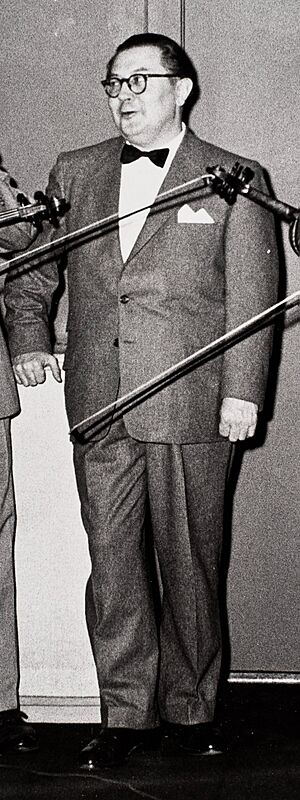Richard Mohaupt facts for kids
Richard Mohaupt (born September 14, 1904 – died July 3, 1957) was a German composer. He also worked as a Kapellmeister, which means he was a music director, often for an orchestra or choir.
Contents
Early Life and Music Career
Richard Mohaupt was born in a city called Breslau (which is now in Poland). He studied music at Breslau University. His teachers were Julius Prüwer and Rudolf Bilke.
After finishing his studies, Mohaupt worked in opera houses. He was a répétiteur, helping singers practice their parts. He also directed music in Breslau, Aachen, and Weimar.
In 1931 and 1932, he went on a concert tour. He played piano and conducted in the Soviet Union. After that, he moved to Berlin in 1932. There, he started working for a film company called UFA.
Facing Challenges and Moving to America
In 1936, Richard Mohaupt had his first big success. It was a ballet called Die Gaunerstreiche der Courasche. This ballet was performed during the 1936 Summer Olympics in Berlin.
But soon after this success, the government at the time, the Nazis, criticized his music. They used a term "Music Bolshevism" to say his art was not what they wanted. Because of this, he was not allowed to work as a musician in Germany. So, in 1939, Richard Mohaupt moved to the United States. He settled in New York City.
Composing in the United States
While living in America, Mohaupt wrote many different types of music. He composed for operas, ballets, and films. He also wrote music for radio, television, and orchestras.
Two of his works became very popular in the 1940s and 1950s. One was an orchestral piece from 1939 called Stadtpfeifermusik (Town Piper Music). The other was his opera Die Bremer Stadtmusikanten (The Bremen Town Musicians). This opera first played in Theater Bremen in 1949.
He wrote another opera in America called Double Trouble. It was first performed in 1954 by the Kentucky Opera. Mohaupt also created music for ballets like Max und Moritz in 1945. This was a fun "dance-burlesque." Another ballet was The Legend of the Charlatan from 1949. Famous American orchestras, like the New York Philharmonic, performed his works.
Return to Europe and Later Works
In 1955, Mohaupt moved back to Europe. He settled in Austria. There, he created his last opera, Der grüne Kakadu (The Green Cockatoo). This opera used a story written by Arthur Schnitzler.
Richard Mohaupt passed away on July 3, 1957, in Reichenau an der Rax, Austria. His last opera, Der grüne Kakadu, had its first performance in 1958. This happened at the Hamburg State Opera shortly after he died.
Main Compositions
Richard Mohaupt wrote many different kinds of music. Here are some of his important works:
Operas
- Die Wirtin von Pinsk (first shown in 1938)
- Die Bremer Stadtmusikanten (first shown in 1949)
- Double-Trouble (first shown in 1954)
- Der grüne Kakadu (first shown in 1958)
Ballets
- Die Gaunerstreiche der Courasche (first shown in 1936)
- Max und Moritz (first shown in 1949)
- Der Weiberstreik von Athen (first shown in 1957)
Orchestral Works
- Drei Episoden (first shown in 1938)
- Concerto for piano and orchestra (first shown in 1938)
- Town Piper Music (first shown in 1941)
- Symphony No. 1 "Rhythm and Variations" (first shown in 1942)
- Concerto for violin and orchestra (first shown in 1954)
 | Ernest Everett Just |
 | Mary Jackson |
 | Emmett Chappelle |
 | Marie Maynard Daly |


